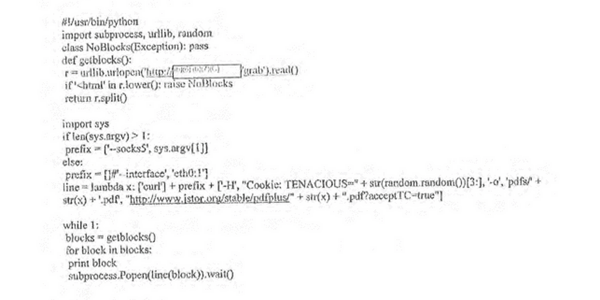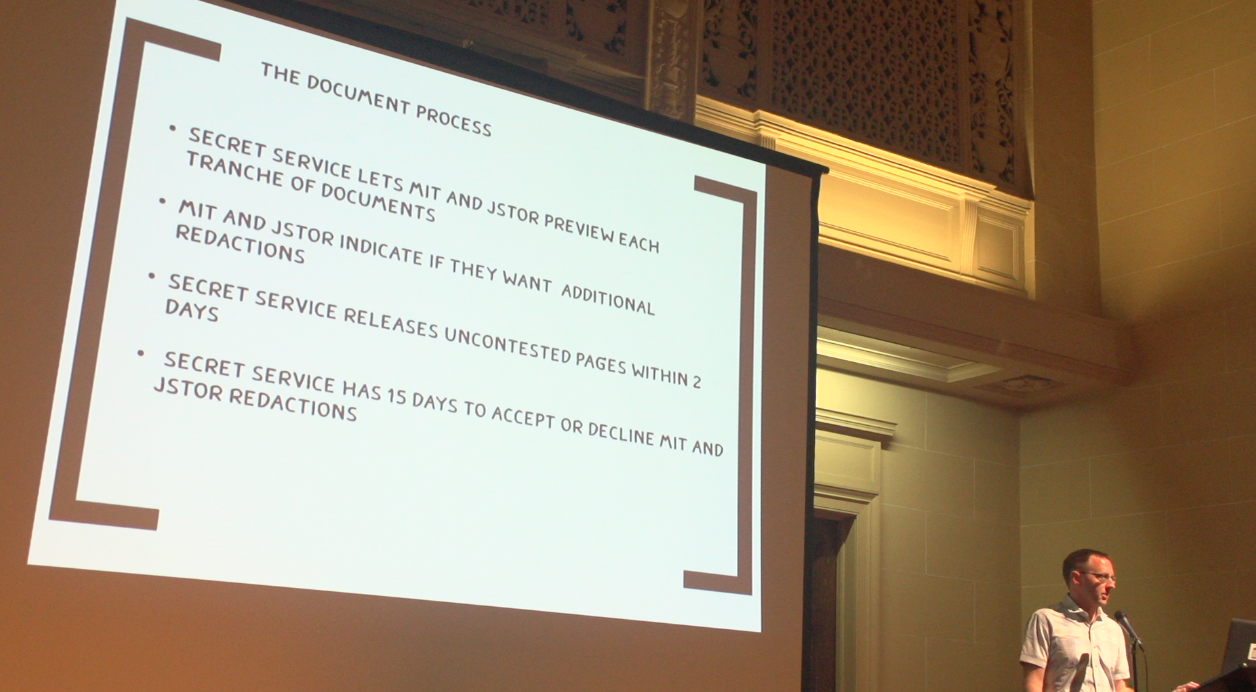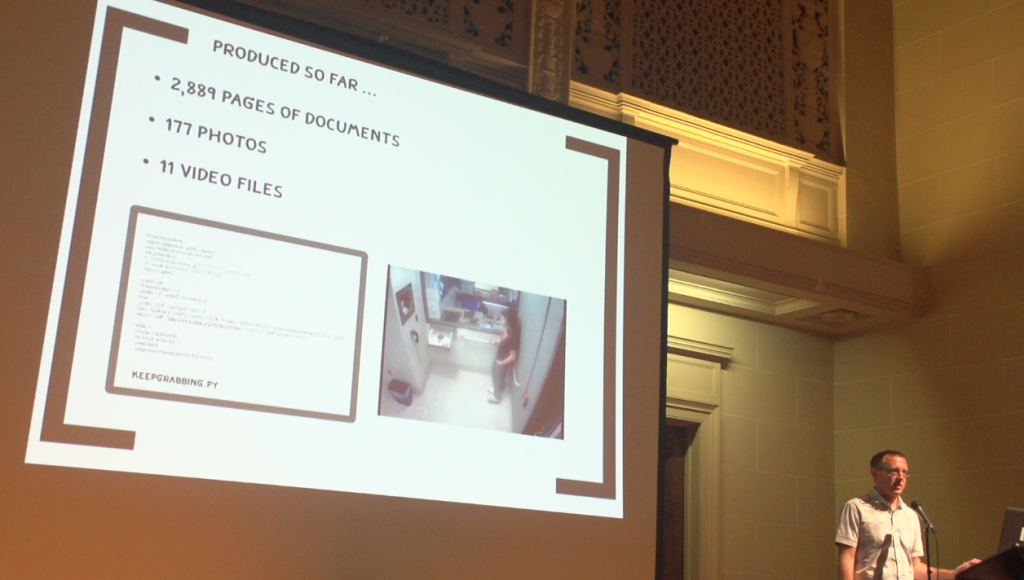Download a Hi-res (.mov) file of Kevin’s Talk

Kevin Poulsen filed a lawsuit over access to the Federal law enforcement documents about Aaron Swartz. MIT intervened in the case as an interested third party – and was awarded the privilege of further redacting the documents before they were made public.
Bottom Line: MIT’s intervention has caused these documents to be released at a much slower rate, so they could redact information about their involvement with the government against Aaron.
The files are all here now at swartzfiles.com.
Here is a complete transcription of last year’s presentation by Kevin Poulsen on this topic. (Let’s band together to put pressure on the U.S. Government to release these files now. :-)
(In case you are just learning about this, I am also including a complete list of references on this topic at the bottom of this post.)
Complete transcription:
My name’s Kevin Poulsen. I’m a contributing editor at Wired magazine, and I’m the one that recruited Aaron to do the project that is now “SecureDrop.” While my presentation is getting set up I’ll say that what the Freedom of the Press Foundation and everybody who’s contributed to that project at the hackathons has made of that greatly exceeds I think, any expectations that Aaron had for that when he was working on it. It’s an astonishing, astonishing achievement, and one that’s become far more important than it was even when we started.
I’ve been asked to talk about my Freedom of Information Act lawsuit against the Department of Homeland Security, and where we stand with the files.
For those just tuning in: After Aaron passed, I, as well as a lot of other journalists and bloggers and independent investigators, very quickly filed Freedom of Information Act requests with the Secret Service, and we all received the same letter (page 3), where the agency summarily denied the request on the grounds that it pertained to an ongoing law enforcement investigation, which was ludicrous under the circumstances.
I filed an appeal. (page 1) The department ignored the appeal, and then, I, with the help of David Sobel, and attorney with EFF and one of the greatest FOIA litigators in the country, we sued DHS and, very quickly, got a court order obliging them to start producing document. (Applause.)
At that point, MIT and JSTOR moved to intervene in the case. They were concerned that, despite the government’s great skill at redacting documents, that some information might slip through that would identify MIT or JSTOR personnel who contributed to the investigation, and they might face some sort of retaliation. Probably from Anonymous.
We reached an agreement with them, where they’re allowed to preview each collection of documents before it’s released to me and suggest redactions of their own. There was some concern at the time that they would abuse that to redact more than just identifying information. So far, it looks like the redactions have just been a word here or there, and email addresses and that sort of thing.
What we’ve gotten so far is 2,889 pages, 177 photos and 11 videos, including the video of Aaron being booked at the Cambridge Police Department.
In the last batch. This will be of interest to maybe two or three of you, that really closely follow this. In the last batch, we actually got the Python script that Aaron wrote to extract the documents from JSTOR. This is actually the thing that I’m asked about the most is “when is keepgrabbing.py going to be released?”

In the last two batches, we’ve seen for the first time some large blocks of material being redacted, and they’re being redacted under FOIA Exemption B5, “Pre-decision Deliberative Processes.” So, if the government is working on something, and they haven’t made a decision, and they’re exchanging memos and back and forth discussing what to do, that’s when that would apply. Or a draft of a treaty. That sort of thing.
And for the first time we’re seeing a notation indicating that an outside agency, not the Secret Service, and not DHS, has made those redactions, and it’s the Executive Office of the U.S. Attorney. And all of these redactions appear to be emails either from or two Stephen Heymann, the prosecutor on the case. So, it’s hard to tell what’s being redacted by definition. It’s not there. But, as it turns out, MIT and JSTOR also released documents, in the wake of the controversy over all of this, and some of them were messages that were redacted from the government’s release. So, we actually can see what’s underneath them. And it’s nothing that you would call a smoking gun. It’s more like, very puzzling why they would want to redact this. So this, message to MIT, from Steve Heymann, or (correction) to JSTOR, from the prosecutor, is asking about the naming of the PDF files that were downloaded. It baffles me as to why they would consider this sensitive.
This one, huge block of redacted text, here, is the reply from JSTOR. You’d imagine this is going to be the Pentagon Papers or something. And no, it’s a detailed examination of the numbering system that JSTOR uses for numbering their documents. Keep in mind this was released by JSTOR voluntarily and redacted by the U.S. Government for reasons of their own. And then this one, again, an entire block. It turns out to be the stuff that the prosecutor is asking MIT to bring to an interview. So this, I think, bears some further scrutiny. I just discovered the unredacted versions of these in the JSTOR documents yesterday, so I haven’t had a chance to talk to David Sobel about it yet. But to me, it looks a little questionable.
If you want to see the documents for yourself. This week, I’ve compiled them all into a single place: swartzfiles.com. You’ll also find the FBI and US Marshall’s files on Aaron there, and a compilation of all the files that have been released by MIT and JSTOR to date, as well as all the videos and the photographs that I just described.
More Articles and Resources about Kevin’s FOIA case and MIT’s intervening:
1. Swartzfiles.com http://swartzfiles.com/
2. WIRED’s Kevin Poulsen on managing investigations, Aaron Swartz and why leaks are the new FOIA – Muckrock.com, by George LeVines – August 2, 2013
https://www.muckrock.com/news/archives/2013/aug/02/wired-kevin-poulsen-foia-aaron-swartz-leaks/
3. First 100 Pages of Aaron Swartz’s Secret Service File Released
Kevin Poulsen Security Date of Publication: 08.12.13.
08.12.13 http://www.wired.com/2013/08/swartz-foia-release/
4. Secret Service Report Noted Aaron Swartz’s ‘Depression Problems’, Kevin Poulsen, Wired, 11.07.13 http://www.wired.com/2013/11/swartz-foia-november/
5. MIT blocking release of Aaron Swartz’s Secret Service files BoingBoing, Cory Doctorow, Jul 18, 2013 http://boingboing.net/2013/07/18/mit-blocking-release-of-aaron.html
6. Judge orders Secret Service to release Aaron Swartz’s files
Boing Boing, Cory Doctorow Jul 9, 2013 http://boingboing.net/2013/07/09/judge-orders-secret-service-to.html
7. MIT asks to intervene in Swartz FOIA suit
July 19, 2013 by Ed Felten https://freedom-to-tinker.com/blog/felten/mit-asks-to-intervene-in-swartz-foia-suit/
8. Aaron Swartz FOIA video playlist
9. MIT intervenes in FOIA release of Aaron Swartz documents, seeks ‘pre-release review’ By Nathan Ingraham, The Verge, July 18, 2013 http://www.theverge.com/2013/7/18/4536566/mit-intervenes-in-foia-release-of-aaron-swartz-documents
10. The MIT surveillance video used against Aaron Swartz is now public By Dell Cameron, Dec 4, 2013 http://www.dailydot.com/news/aaron-swartz-mit-surveilance-video-released/

